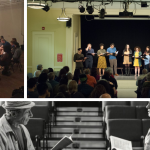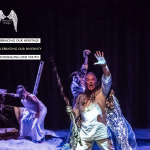Genre: Musical Theatre
Venue: Union Theatre 204 Union Street, Southwark. SE1 0LX
Low Down
Sasha Regan’s vision for Patience at the Union Theatre deserves high praise for its use of imaginative design for stage, costumes and lighting, inventive choreography, and, above all, intelligent use of cross-dressing to highlight the punch in Gilbert and Sullivan’s satirical comic opera. From where I sat, the production’s talented ensemble consistently evoked expressions of delight from the audience as it followed the trials and tribulations of soldiers and poets battling for the affections of ‘love-sick maidens’. Love-sickness and narcissism fuel a battle of the sexes, represented on stage through a pastoral, idyllic style which seethed with the sexiness of its young male cast who all thoroughly subvert the genteel conventions of romantic love, contradictorily with unbelievable delicacy.
Review
As the musical stirrings of the opening chorus brings on ‘Twenty love-sick maidens we’, the idea of womanhood as an ‘affectation’ seems to glide on stage to immediately establish Reginald Bunthorne’s absurd good fortune of being adored by twenty young women, seething with desire for him. But ingeniously, in this opera ‘boy meets girl’ is not the main business. Instead, we are given a spectacular assortment of complicated relationships between those who are not who they seem (Reginald and Patience); others how don’t look anything like they ought to look (the Duke and Jane); still others who are just too perfect (Patience and Archibald).
In their own way G & S play in Patience in 1881 with a theme that Jane Austen tackled in 1811 in Sense and Sensibility when she characterised the rational and practical Elinor in opposition to the highly emotional Marianne. The idea of an ‘aesthete’ as represented in the figure of the poet is synonymous with not doing anything particularly practical but…well… write the occasional line of poetry. At the other end of the scale, men of action, like ‘the soldiers of the Queen’, are purposeful and made up of “all the remarkable people in history”.
In making her cast an all-male one, Sasha Regan is able to show the dilemma of mankind as a narcissistic problem – men reflecting only the experiences of men. Dispensing with women altogether, the audience see them pandering to their foolish reflections of what it means to be a real man: the action-man in army boots versus the sensitive-guy holding his book of poems. Both are ridiculous when taken to their extreme. This is where Patience performs her essential role: in her naivety she realises she can only love an imperfect manin order that she can sacrifice herself to him as a dutiful wife. Irony upon irony, the woman’s role is captured in the production as the antithesis to achieving her own sense of pleasure: she literally exists only to please her man. To this end, Drew McOnie’s imaginative choreography brilliantly uses small hand-held props to both aid characterisation and embody the many ironies wittily: wool that gets tangled in the choral action and teapots and teacups moving around the space timed and synchronised
Meanwhile, the Union’s use of G & S music is faithfully scored and true to style. Musical Director, Richard Bates shapes the whole musical experience beautifully. The audience is never disappointed by the singers’ delivery of the comic opera’s recitative-style lyrics. Of the actors, the very least that can be said is that they all possess great voices and dance brilliantly. The leading performances by Dominic Brewer as Reginald and Stoifan O’Doherty as Archibald and Edward Charles Bernstone as Patience are strong, and supported by an equally strong ensemble. Edward Simpson’s Colonel Calverley deserves the articulation prize for his delivery of G & S lyrics such as “If you’re anxious for to shine in the high aesthetic line”.
All cast members show a discipline and control that allows the text and music to carry them through its brilliant satire, rather than imagine the cross-dressing, for instance, in cabaret style.
The explosion of applause when Patience finally gets her man is strong and sustained for many curtain calls. Rightly so! It seems that in the hands of Sasha Regan, Gilbert and Sullivan might have written Patience not in 1881 but just for us in 2012, as we continue to discover the layers of contradiction in forming relationships in our more ‘gender bending’ times.
Reviewed by Josey De Rossi 23 February 2012
Website :
http://www.uniontheatre.biz/





